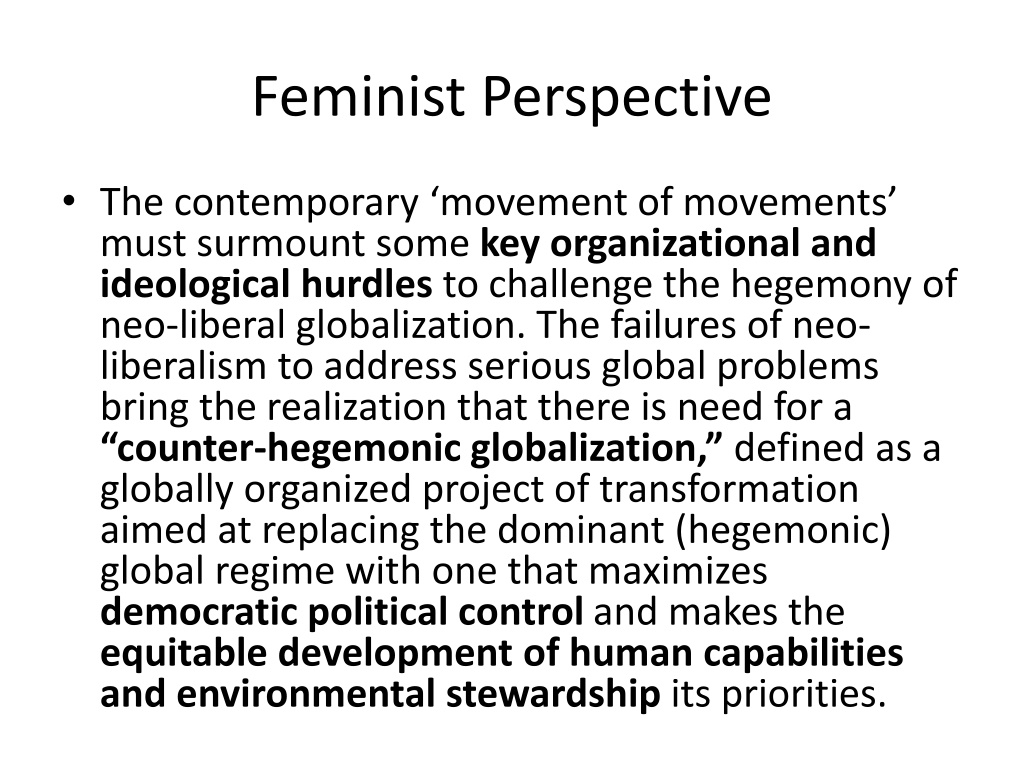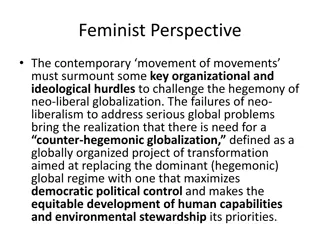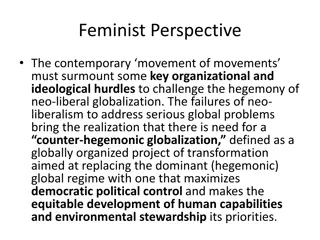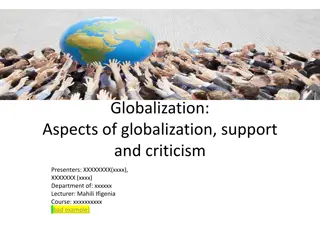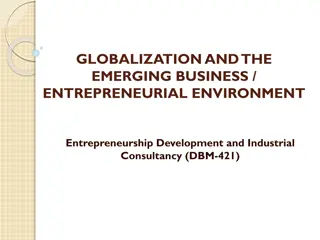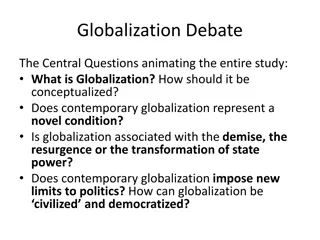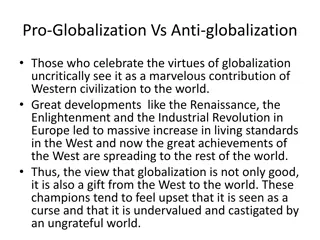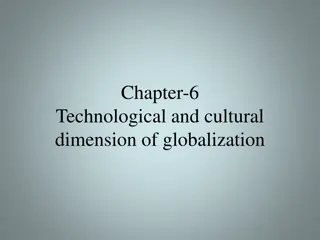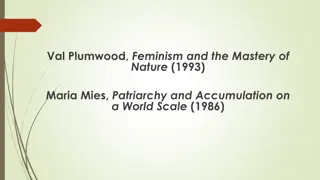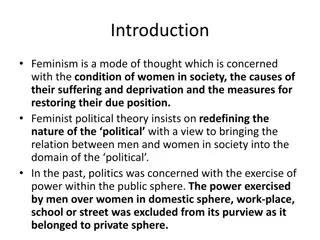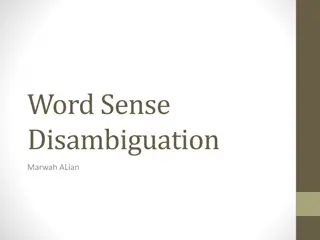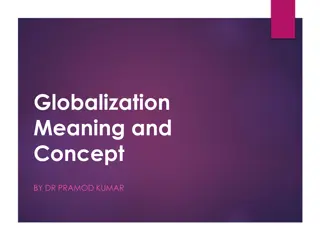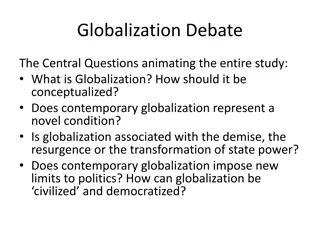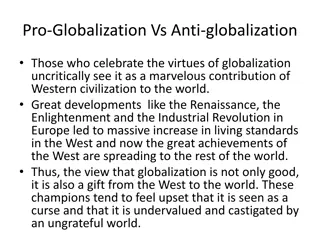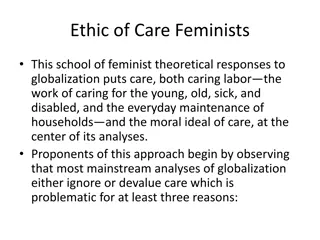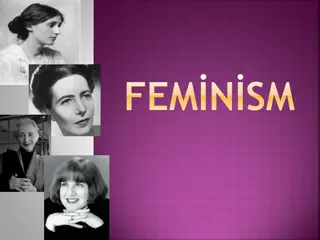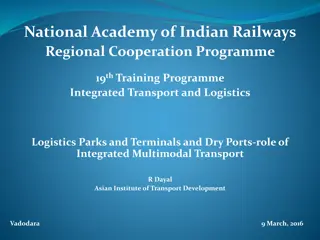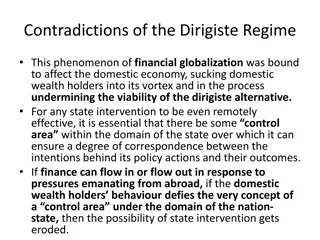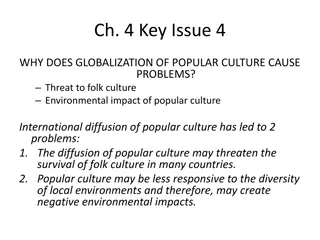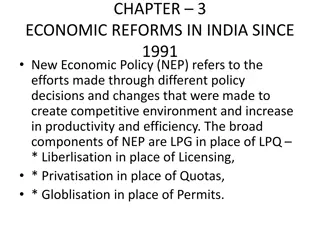Challenges and Evolution of Feminist Approaches to Globalization
The contemporary feminist movement faces organizational and ideological hurdles in challenging the hegemony of neo-liberal globalization. Feminist perspectives on globalization aim to address gender injustices with a focus on specific issues. Early feminist analyses were criticized for not considering systematic gendered injustices associated with neoliberalism. A shared commitment to core feminist values and rearticulating human rights from a feminist perspective are key features of feminist approaches to globalization.
Download Presentation

Please find below an Image/Link to download the presentation.
The content on the website is provided AS IS for your information and personal use only. It may not be sold, licensed, or shared on other websites without obtaining consent from the author. Download presentation by click this link. If you encounter any issues during the download, it is possible that the publisher has removed the file from their server.
E N D
Presentation Transcript
Feminist Perspective The contemporary movement of movements must surmount some key organizational and ideological hurdles to challenge the hegemony of neo-liberal globalization. The failures of neo- liberalism to address serious global problems bring the realization that there is need for a counter-hegemonic globalization, defined as a globally organized project of transformation aimed at replacing the dominant (hegemonic) global regime with one that maximizes democratic political control and makes the equitable development of human capabilities and environmental stewardship its priorities.
Different Feminist Approaches Feminist theoretical approaches to globalization is an umbrella term that refers to a number of specific theoretical approaches that feminists have used to articulate the challenges that globalization poses for women, people of color, and the global poor. These various approaches include those developed by postcolonial feminists, transnational feminists, and feminists who endorse an ethics of care.
Key Features Feminist approaches to globalization seek to provide frameworks for understanding the gender injustices associated with globalization. Rather than developing all-encompassing ideal theories of global justice feminist philosophers tend to adopt the non-ideal theoretical perspectives, which focus on specific, concrete issues. Early feminist analyses focused on issues that were widely believed to be of particular importance to women around the world, such as domestic violence, workplace discrimination, and human rights violations against women. Many feminist philosophers view this approach as too narrow, both in terms of the specific issues it addresses and its methodological approach to these issues.
Limitations of Early Feminists Moreover, by addressing specific global women s issues as independent phenomena, early feminist analyses failed to take into account the systematic and structural gendered injustices associated with neoliberalism. Although gender oppression takes different forms in different social, cultural, and geographical locations, women in every society face systematic disadvantages, such as those resulting from their socially assigned responsibility for domestic work. Because of these structural injustices, women of all nationalities tend to suffer more from the poverty, overwork, deprivation, and political marginalization associated with neoliberal policies. Thus, more recent feminist analyses of globalization tend to understand the outcomes of globalization not as disparate or contingent phenomena, but rather as a result of systematic, structural injustices on a global scale.
Key Features (Contd.) Another key feature of feminist approaches to globalization is a shared commitment to core feminist values, including an opposition to the subordination of women. Many feminists also use the language of human rights to address the challenges of globalization. While they acknowledge that traditional understandings of human rights are implicitly male-biased, they contend that feminist rearticulations of these norms can help to identify the gendered harms involved in sexual slavery, forced domestic labor, and the systematic withholding of education, food, and healthcare from women and girls that follow from severe economic deprivation.
Relational Model However, not all feminist political philosophers agree with this approach. Some believe that new feminist ideals, such as relational understandings of power, collective responsibility, and mutual dependence, are needed to diagnose the gender injustices associated with globalization. For example, Iris Marion Young argues that the traditional ideal theories of justice are unable to account for the unjust background conditions that contribute to the development of sweatshops in the global South. She argues that a new relational model of responsibility, which she calls the social connection model, is needed to articulate the obligations that people in affluent northern countries have to workers in the global South.
Social Connection Model of Iris Marion Young The social connection model holds that individuals bear responsibility for structural injustices, such as those suffered by workers on the global assembly line, because our actions contribute to the institutional processes that produce such injustices. In particular, northern consumers have a responsibility to organize collectively to reform the injustices associated with sweatshop labor.
Feminist Methodologies The third key feature of feminist approaches to globalization is an emphasis on feminist methodologies. In particular, these approaches tend to embody three key methodological commitments. The first is intersectionality, which maintains that systems of oppression interact to produce injustices, and thus, that gender injustices cannot be understood solely in terms of sex or gender. Feminists who theorize about justice on the domestic level argue that women s experiences of gender oppression are shaped by other forms of oppression, such as those based on race, class, disability, and sexual orientation. Feminist theorists of globalization contend that gender oppression interacts with these systems of oppression, along with other forms of systematic disadvantage that arise within the global context.
